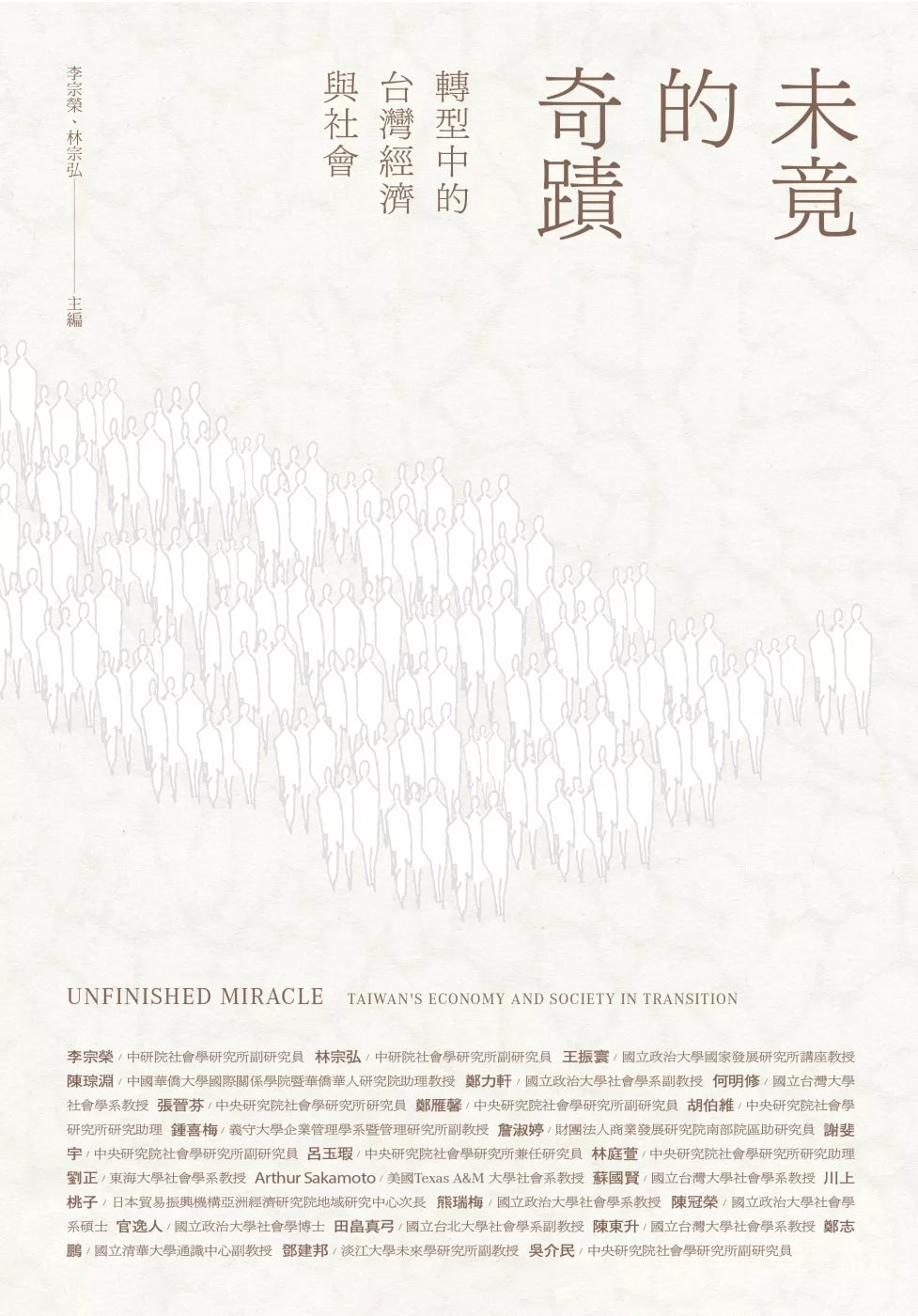1
/
of
1
An Unfinished Miracle: Taiwan's Economy and Society in Transition
An Unfinished Miracle: Taiwan's Economy and Society in Transition
Arthur Sakamoto , Momo Kawakami , Wang Zhenhuan
Regular price
$34.99 USD
Regular price
Sale price
$34.99 USD
Unit price
/
per
Low stock
Couldn't load pickup availability
About Book
About Book
Unfinished Miracle: Taiwan's Economy and Society in Transition
Taiwan's economy has undergone dramatic changes over the past two decades, with profound political and social consequences. Editors Li Zongrong and Lin Zonghong have invited leading Taiwanese economic and sociological scholars, both domestically and internationally, to contribute books and articles addressing these key issues. This book consists of an introduction and four parts. In the first chapter, the two editors argue that before the end of the 20th century, Taiwan's successful economic development experience attracted the attention of domestic and international academic circles. The literature on the "miracle model" of this period is divided into macro and micro levels of analysis. The macro level believes that Taiwan's open trade within the world system and Cold War geopolitics, the support of Chinese families or Confucian culture, the demographic dividend brought about by family planning, and a highly autonomous development state and financial regulation may have been factors that created the economic miracle. The micro level is that the network and innovation of small and medium-sized enterprises may have been factors that created the economic miracle. Its political consequence was the confrontation between the authoritarian system and the local middle class.However, at the beginning of the new century, Taiwan was hit by multiple global financial crises and economic recessions, which brought about a paradigm shift in economic sociology. The academic problem consciousness shifted from explaining the Taiwan miracle to explaining why Taiwan was facing economic recession and social division. We call this the "recession paradigm."
On a macro level, "decline paradigm" research has found that globalization, especially cross-strait trade, has brought diminishing benefits to post-industrial economies, leading to more unequal income distribution. Changes in neoliberal ideology and government-business relations have led to national fiscal crises and dysfunction (see Wang Zhenhuan and others in this book), rapid concentration of financial capital (see Zheng Lixuan in this book), and gender discrimination within Chinese family culture (see Zhang Jinfen in this book), resulting in the demographic consequences of late marriage and childbearing, fewer children, and an aging population (see Zheng Yanxin in this book), and even severe labor exploitation (see Liu Zheng and others in this book). Furthermore, we have introduced the disadvantaged labor movement (see He Mingxiu in this book) and focused on social exclusion and future prospects in Taiwan's labor market. This is the first part of the book.
At the micro level of organizations and networks, the second part of this book, "Recession Paradigms," finds that companies are becoming larger in size (see Lin Zonghong and Hu Bowei in this book) and that conglomerates are becoming more family-owned (see Li Zongrong, Zhong Ximei, and Zhan Shuting in this book). Despite the impact of these trends, small and medium-sized enterprises are still resisting stubbornly, and some hidden champions in the manufacturing industry have emerged (see Xie Feiyu, Lu Yuxia, and Lin Tingxuan in this book).
Taiwan's industrial development faces a dilemma: upgrading and innovation versus relocation in pursuit of cheap labor. The third section of this book focuses on industrial innovation. While Taiwan's skilled talent networks facilitate industrial upgrading (see Momoko Kawakami and Mayumi Tabata in this book), network research under the influence of the "recession paradigm" has found that Taiwanese businesses are gradually losing their technological advantages (see Xiong Ruimei et al. in this book), facing threats from the rise of the "red" supply chain. Sociologists, however, are turning their attention to innovation for a more equitable social economy (see Dongsheng Chen in this book). The fourth part of this book explores the relocation of industries. Cheng Chih-peng, Lin Tsung-hong, Deng Jian-bang, and others find that Taiwanese businessmen in China are gradually heading towards poverty, while the relocation of industries to mainland China has created a cross-strait political and business alliance (see Wu Jiemin in this book), bringing about the political consequences of class division and generational conflict, which were manifested in the Sunflower Movement and the subsequent political changes.
This book is the culmination of years of collaborative research by the "Business and Society" research group at the Institute of Sociology, Academia Sinica. In the introduction, the two editors explain the reasons for collecting and organizing the two strands of literature on the miracle-to-decline paradigm. They also use paradigm shifts to understand the shifting consciousness of Taiwanese scholars, their transplantation and innovation of various schools of New Economic Sociology, and propose future research directions.
Publication Date
Publication Date
2017-12-21
Publisher
Publisher
中央研究院社會所
Imprint
Imprint
Pages
Pages
750
ISBN
ISBN
9789860541298
share

